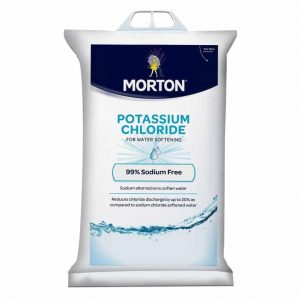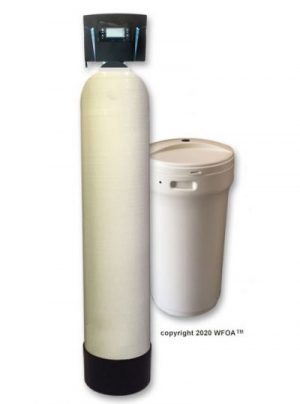What Water Softener Salt is best for you?
What water softener salt is best for any water softener system? Blocks? Pellets? Crystals? Rock Salt? With all the water softener salt choices, it can be very confusing!
The truth is, any softener can use any kind of salt. And any salt is better than no salt. But keep in mind that there are many dirty types of salt that can leave residue and contaminants behind. Many in-home sales companies love this because it can create expensive service calls over time. The video below is very short and reveals the best water softener salt for ANY water softener.
Beware of in-home sales company's recommendations. In many cases, they are trying to create expensive service calls by supplying dirty salt, or salt that might clog slat (Brine) lines. They often also turn up the slat measurements so you will use more salt. And that means you will buy more salt from them!
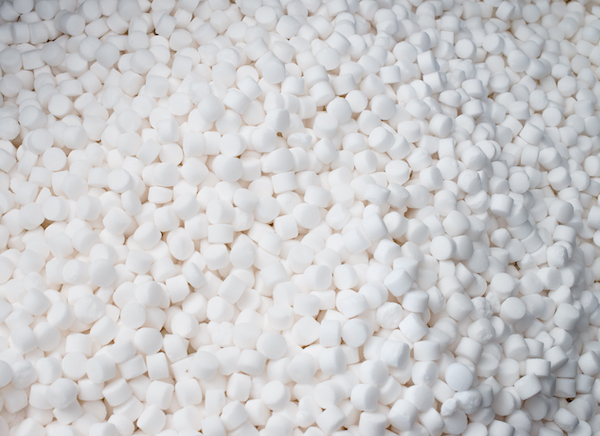
Why does a softener need salt?
Hard water is made up mostly of calcium and magnesium. The water softener tank is filled with tiny resin beads with sodium ions attached to them. When hard water comes into contact with the resin beads, the calcium and magnesium ions attach to the resin beads and “bump” the sodium ions off. Once the resin beads are full of the calcium and magnesium ions, the system is regenerated. The tank is flushed with salt water from the brine tank. This knocks off the calcium and magnesium ions and exchanges them with sodium ions. Now the resin is ready for more hard water. Read about the benefits of soft water here.
Should I use salt crystals in my water softener?
Crystals are a salt that can easily clog the salt line on a softener, thus creating service calls for the local dealer. We do not recommend using crystals in a water softener.
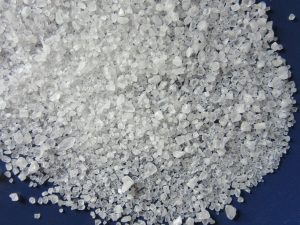
Can I use rock salt in my water softener?
While you may be tempted to use rock salt for your softener, this type of salt is NOT designed for use as water softener salt. Rock salt is mined from salt deposits underground and can leave behind a lot of dirt and residue. The residue left behind may cause a lot of maintenance or expensive service calls. Also rock salt has jagged edges that can break off and clog salt lines on your water softener. It is not a salt with smooth rounded edges like pellet salt. Be wary of anyone who would suggest that you use rock salt in ANY water softening system.
Is block salt good for water softeners?
STAY AWAY from any type of “Block” salt. You have probably noticed some sort of variation of this kind of salt before. It looks like a big block, like you might see in a field for cattle or other animals. It is often the kind of salt that leaves your salt tank very brown and murky over time. Not good. And it is less efficient due to minimal surface area of the salt exposed to the water. We see a lot of In-Home Sales Dealers use this salt. Be careful in dealing with such people. They either don’t know any better, or are purposely creating future issues that may cost you a lot of money.
What is the best kind of salt to use in my water softener?
The BEST salt to use in ANY softener, in our opinion, is Morton pellets in the YELLOW bag. Sometimes they call it "system saver", sometimes "solar salt", sometimes something else. But if it is Morton Pellets in a yellow bag, it is the cleanest. It dissolves easily and doesn't leave behind the residue that other salt often does. Also, it is usually the most inexpensive as well. It usually comes in 40 pound or 25 pound bags. The 40 pound bag is a better value normally.
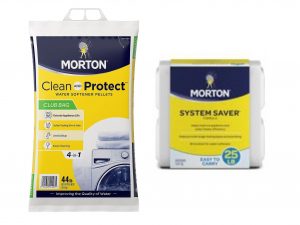
Can I mix different types of salt in my brine tank?
Can I mix different types of salt in my water softener brine tank? The short answer is yes. But be a little careful with it. If you want to change the type of water softener salt you are using, it is best to wait until the salt level is low before adding the new salt. This will help to limit the difference in dissolve rates for different types of salt. But remember that you CAN NOT mix sodium salt with potassium salt. Potassium salt is considered an environmentally friendly salt. Be sure to thoroughly clean your salt tank and regenerate the softener twice, when changing over from sodium salt (Sodium chloride) to potassium salt Potassium chloride). And vice versa.
Can the type of salt I use impact the system's performance?
Using “dirty” salt that contains impurities can affect the ability of a water softener to do an efficient job. And it can have a huge impact on maintenance. Impurities in the salt leave deposits in the water softener. When build up occurs, the softener must be flushed and the brine tank cleaned. These deposits may also wear down the internal parts of the softener and shorten its life span. It is best to use the “cleanest” water softener salt. Or the salt that has the least amount of impurities. Cleaner salt means less maintenance.
How often should I add salt?
The amount of water softener salt you use will depend on how hard your water is and how much water your household uses. All of our “metered”, our demand water softeners are very efficient. They regenerate based on your water usage rather than every day like some softeners. This means less salt usage. Some people only need to add salt once a year!
Can I use Potassium instead of Sodium in my water softener?
Any softener can use either sodium or potassium salt. But as a rule, you will use 12% more potassium than salt. And potassium is usually about three times as expensive as common sodium salt. The softener will regenerate more often since potassium is not as efficient. You may need to adjust the settings on your softener to get the results you need. If you do decide to use potassium salt. Be sure to use the pellet kind. Just as you would sodium salt. And Morton is a good clean brand.
If someone tells you potassium salt is better to drink than sodium salt, run for the hills! Drinking potassium in your water can be a really bad idea as well. Potassium should be used solely as an environmental consideration. For example, if you have to use the soft water for plants, grass or vegetation. Potassium is far more environmentally friendly. You really should not drink from a water softener whether it is sodium or potassium based salt.
Finally, always remember that you should not drink the water from ANY water softener. Regardless of the sales pitch. Either add an inexpensive reverse osmosis unit in the kitchen for drinking water. Or buy bottled water. Read more about drinking soft water here.
